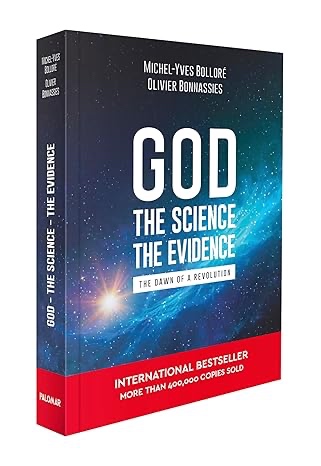God, The Science, The Evidence, By Michel-Ives Bolloré and Olivier Bonnassies
‘International bestseller which is lengthy but easy to read, and presents clear and logical scientific (and some non scientific) arguments for the possible existence of a creator God’
 God, The Science, The Evidence
God, The Science, The Evidence
By Michel-Ives Bolloré and Olivier Bonnassies
Palomar
ISBN 9789998782402
Reviewed by the Revd Dr Ernest C. Lucas
Originally published in French in 2021, this book has become an international bestseller. Its goal is to challenge the ideology of materialism which dominates western culture by presenting ‘the most up-to-date rational arguments for the possible existence of a creator God’ (p. 31).
The first two-thirds of the book presents scientific arguments. The Second Law of Thermodynamics predicts the end of the universe in a state of maximum disorder at absolute zero temperature. This implies that it began in a highly ordered, very hot state. If so, who or what caused its beginning? Einstein’s General Theory of Relativity predicts an expanding universe and in 1929 Edwin Hubble provided the observational evidence for this.
So, the Big Bang Theory was born. Attempts to understand its beginning conclude that it was a ‘singularity’, an extremely hot, dense state in which all known scientific laws breakdown, meaning there is no scientific explanation for it.
Since the 1970s cosmologists have recognised the fantastic ‘fine-tuning’ of the universe for the existence of life. Besides the natural laws, the universe’s nature depends on about 20 parameters which were fixed at universe’s beginning and are invariable. A very miniscule change in the value of any one of them would result in a universe very different from the one in which life as we know it is possible. Is this the result of blind chance or of a highly intelligent creator?
There is a similar ‘fine-tuning’ argument in biology, though there is danger of ‘over-claiming’ here because cell and molecular biology are such new sciences. The attempt to explain the fine-tuning by postulating the existence of a ‘multiverse’ of billions of universes, each with its own set of laws and parameters, is a speculation without scientific evidence to support it.
Refusal to consider evidence for God from outside science is unreasonable because many such evidences are open to rational assessment. In the final third of the book the authors discuss four such areas.
The first is the nature of the Bible. They argue that it contains truths which were humanly inaccessible at the time it was written. They see this as evidence of divine revelation.
They discuss the evidence for who Jesus was, arguing that he was not just a great sage, or prophet, or human Messiah, but God made man.
Strangely, they do not explicitly discuss the evidence for his resurrection. In what they recognise is a sensitive topic, they see evidence of God at work in the history of the Jews. They present the Fatima Apparition of October 13, 1917 as an example of a miracle that cannot be dismissed as a deception or illusion.
The book is lengthy but easy to read. The science is presented in a clear, accessible way. The non-scientific arguments are more open to dispute. Occasionally, they possibly claim too much or ignore possible counter-arguments.
However, the case is presented clearly and logically, challenging the readers to make up their own minds, perhaps after doing further research for themselves.
Ernest Lucas is Vice-Principal Emeritus, Bristol Baptist College and has doctorates in Chemistry and Biblical Studies. He was a research biochemist before studying theology and being ordained
Baptist Times, 28/11/2025